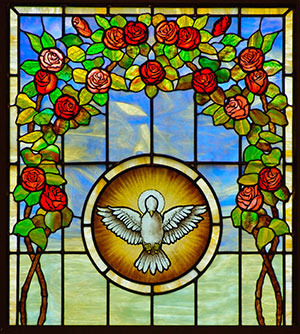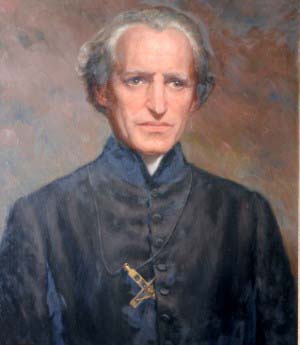
When we speak of or hear the word "Pentecost", at least for me, this conjures up in our minds the various representations of the descent of the Spirit upon the apostles. We are all familiar with the drawings or paintings of the tongues of fire that dwelt on the heads of the apostles as well as on the heads of those present with them. The gift was given to all, and wonderfully, is still given to the believers in Christ and in his Resurrection.
From the Greek, Pentecost conveys the idea of fifty. There was also a Jewish feast by this name, the Feast of Weeks, Shavuot, a feast of the harvest. Having somewhat different meanings and falling on different dates for the Sadducees and the Pharisees, it also celebrated the gift of the Law to Moses. Of course, our Christian faith brings us to celebrate the special gift of God’s love through the sending of the Paraclete, the Councilor, the Advocate, upon us.
There is some debate as to exactly when (on the Resurrection day? (Jn 20, 22) later? (Acts 2,1-4) or both?) and how this occurred. In our Roman Catholic liturgy, we celebrate Pentecost some 50 days after Easter. John (14:16-17, 15:26 and 16:7) and Luke (24:49) mention the sending of the Holy Spirit promised by Jesus, whereas the two older gospels, that of Mark and Matthew, do not mention this. The preaching of the apostles in different languages (Acts 2: 5-13) shows too that the message of salvation is universal and not solely destined to the Jews.
Regardless of the when and how the gift of the Spirit took place, the important thing is that something miraculous did happen in fulfillment of Jesus’s promise. How else could a cowardly bunch of men, Peter in the forefront, most of them of little education, come to do what they did, namely to proclaim with bold assurance the divinity of the one they had seen suffering the ignominious death of the cross? How could they have endured persecution, contradiction, prison, exile without the strength given by the Consoler? Humanly speaking, impossible. The same goes for Paul, he the terror of Christians becoming the Apostle of the Nations. There was a Pentecost for him too.
Read more reflections by Holy Cross religious
And on the Church itself, how could it have sustained the onslaught of erroneous doctrines, the divisions and atrocious persecutions, even the decimation, of the first centuries were it not the for the spirit of fortitude with which God has enriched it. Having survived until this day the scandals of even humanly fallible popes, of the myriad scandals of men of the Church, our Church receives its breath of life and existence from the Spirit, again promised by Jesus, in that the gates of Hell would not prevail.
Through Baptism, we received the outpouring of the Spirit. It was our Pentecost and it is always that Spirit which strengthens us, guides us, illumines our way, keeps us faithful and makes us capable of believing and loving our Lord. Were it not for the Holy Spirit in our lives, how many times would we not have gone astray? We can be always grateful for the inspirations to do good and for those to turn away from doing what is wrong. Again the work of the Spirit in us.

The theologian and seminary professor that he was, our blessed founder, Fr. Basile Moreau, devotedly proposed a meditation on the mystery of the Pentecost. In his writing on the Pentecost, Blessed Moreau points out how the apostles, having been at the school of Jesus during three years, failed in their learning. They simply flunked out on the finals! It took the Holy Spirit to redress them; on their own, they never would have made it. In spite of their failure, and to counteract it, they received from the Paraclete the most thorough understanding of the divine mysteries and promises of Jesus. “Sometimes he fills them with astonishing insights that make them superior to the highly learned and to the most renowned philosophers” (Meditation on the Mystery of Pentecost, in Grove and Gawrych, Basil Moreau: Essential Writings, Ave Maria Press). Our founder reminds us too that this same Spirit will descend upon those whose hearts are ready to receive him. May it be so for all of us.
When we sign ourselves, or when we say the Glory be, we invoke the Holy Spirit as part of the Trinity that we are proclaiming. The Spirit, having as his all that is theirs, is on a par with the Father and the Son. Saint Catherine of Siena saw in the Spirit, the person of the Godhead who “gave her the will that enables her to love” (Divine Office, Reading of the Day, Feast of St. Catherine of Siena).
It is in that love that we are grounded and find our light, peace, and joy, thanks to the Spirit. Veni Creator Spiritus.
This reflection for the Feast of Pentecost comes from Fr. Paul LeBlanc, C.S.C., who serves in the General Administration of the Congregation of Holy Cross. He is a member of the Providence of French Canada.